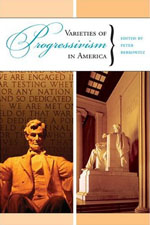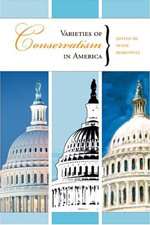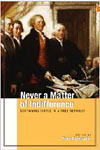The New Republic, Sept. 1, 1997
The Politic Moralist
A review of Hypocrisy and Integrity: Machiavelli, Rousseau, and the Ethics of Politics by Ruth W. Grant
University of Chicago Press. 201 pp. $22.50.
It is fitting that President Clinton issued his recent call for a "national conversation" while he was on campus. It is unlikely that he keeps up with contemporary scholarship, but his call from the University of California at San Diego for a country-wide discussion of race uncannily echoed a theme that cuts across rival schools in the world of academic political theory. This theme is that conversation is the essence of politics.
The numerous scholars who have been composing variations on this theme have been more impressed by what sets their contributions apart from each other than by the common commitment that informs all their work. To an outsider, however, it must be amazing how much the professors, when talking about politics, talk about talk. Rawlsian liberalism places in the forefront of its reflections on politics the idea of public reason, the purpose of which is to set firm boundaries on, and establish formal criteria for, public discussion in a liberal democracy. Communitarian or civic republican critics respond that the idea of public reason is too restrictive: by bracketing questions about the good, by formally excluding substantive argument about first principles and ultimate convictions from political debate, Rawlsian liberalism creates a cramped public life that deprives citizens of the opportunity to achieve the liberty that comes from sharing in self-government. For sharing in self-government means deliberating with fellow citizens about the common good. Civic republican theorists aim to widen the conversation and place more fundamental issues on the agenda than is allowed by the idea of public reason. In the name of liberty and the public good, they want citizens to bring their most deeply held moral and religious beliefs to political discourse and make them the subject of public disputations.
Deliberative democrats, led by Jurgen Habermas abroad and by influential political and legal theorists at home, in effect seek to split the difference between Rawlsian liberals and their civic republican critics. Like Rawlsian liberals, deliberative democrats want to articulate procedural constraints that define the permissible forms of political argument and set limits on the substantive issues that may be appropriately discussed in the public sphere. And like civic republicans, they want an engaged political discourse in which citizens talk more to one another and participate with greater energy and effectiveness in the determination of the laws that govern their lives.
Meanwhile, despite their sometimes flamboyant repudiation of reason and extravagant calls for the radical remaking of social and political relations, postmodern political theorists agree with the shared goal of deliberative democrats and civic republicans. They, too, desire the invigoration and the expansion of democratic participation. Postmoderns "contest the boundaries" of the political, which much of the time does not mean a widening but a refocusing of the public agenda, and in practice does not involve an enlargement of the established terms of debate so much as a demand for debate on their own terms.
In fact, most postmoderns are not at all eager to put all questions up for discussion--questions, say, about the disadvantages of democracy, or the reasonableness of the repudiation of reason, or the goodness of postmodernism itself. And in this discrepancy between their bold rhetoric and their timid agenda, they are not alone among the proponents of the politics of conversation. Deliberative democrats have devised complicated rules and procedures for keeping the demos in line and on point, while civic republicans display little enthusiasm for engaging seriously the full range of moral and religious convictions already present in the public realm. Indeed, with all the hand-wringing about the current state of our national conversation, and with so many of the professors pointing their fingers at liberal principles, it is easy to lose sight of the fact that the enlarged and enhanced conversation that liberalism's critics envisage is one which always presupposes, and usually seeks to expand, liberalism's core principles of liberty and equality.
So there is a consensus in America that conversation, properly conceived, is a cure for much that ails our public life. It is not often remarked, however, that this cure, like any other, may have unpleasant side effects or substantial costs. For a start, making talk the essence of politics can be highly destabilizing: you may well come to despise what others have to say, and they may grow disgusted or infuriated when they listen to what you have been thinking. Candor often makes life harder and uglier, not easier and lovelier. And who really benefits from the politics of conversation? The conversants, obviously. The well-educated, the plugged-in and the velvet- tongued have a considerable edge in the burnishing of reputation and the acquisition of power when conversation is made the mark of civic involvement.
Indeed, aren't intellectuals who commend a politics of conversation--as opposed, say, to a politics based on self-interest rightly understood or grounded in generosity, loyalty, self-sacrifice and courage--a bit like the wealthy who defend the property qualification? Don't such intellectuals, like oligarchs of all ages, place themselves in the compromised position of advocating a general principle that directly advances their own class interest? And isn't there a sunny and ironic Enlightenment optimism that lies behind the various criticisms of liberalism in the name of conversation, a common faith that in an engaged and garrulous political discourse, by contesting the boundaries, by problematizing principles and practices, the truth will out? Or is it rather, as the elegant arguments in Thomas Nagel's important new book, The Last Word, might suggest, that the proponents of the politics of conversation have, in tacit and sometimes open conformity to the irrationalism and the anti-foundationalism of the age, given up on truth, and reduced reason to nothing more than the consensus of the community?
Yet the strangest difficulty with the scholarly defense of discourse as our defining political action is not that it takes conversation too seriously, but that it does not take conversation seriously enough. For conversation, an egalitarian activity open to all, and one of life's delights, is an elusive art. Mastering the art of conversation requires a rare combination of gifts: a discerning eye, an alert ear, a generous heart, a disciplined mind, a respect for the weakness of words, an attentiveness to silence's subtle textures. In the best of circumstances, when friends meet face to face, conversation provides not only a respite from the idle chatter that gets one through the day, but also an opportunity to share memories, form dreams, explore old ways and set out on new paths. In ordinary circumstances, distance and distraction and distrust intrude. And yet every conversation somehow contains the promise of a meeting of hearts and minds, of a self- perfecting world of patience and respect. So conversation is a token of the troubled coexistence in our world of the real and the ideal, an everyday act that holds out the prospect of a mutual trust that transcends words, but more often reminds us rudely of the barriers between us.
Conversation, at least for the conversant, is also a fertile breeding ground for hypocrisy, since it is easier to falsely profess conviction and devotion than it is to falsely exhibit them in deeds. At the same time, perhaps because they are more adept at getting away with pretense and playacting in conversation, those who make a profession out of professing their devotion to conversation sometimes seem particularly touchy when it comes to confronting the haven to hypocrisy that conversation provides. In truth, conversation both harbors and hates hypocrisy. And in this paradox, it turns out, conversation has something in common with liberal democracy.
More than a decade ago, in Ordinary Vices, the book in which her unforgettable voice can be heard most distinctly, Judith Shklar identified the sources in liberal democracy that promote hypocrisy while making citizens hypersensitive to its practice: "The paradox of liberal democracy is that it encourages hypocrisy because the politics of persuasion require, as any reader of Aristotle's Rhetoric knows, a certain amount of dissimulation on the part of all speakers. On the other hand, the structure of open political competition exaggerates the importance and the prevalence of hypocrisy because it is the vice of which all parties can and do accuse each other." Still, as Shklar knew when she wrote those lines, readers of Aristotle's Rhetoric were scarce. And they are growing scarcer every day, so it is all the more necessary to stress that inasmuch as it takes the liberal democratic emphasis on open persuasion in the public sphere and makes it a consuming concern, the politics of conversation does not escape what Shklar calls the paradox of liberal democracy.
In these circumstances, Ruth W. Grant's careful study of the problem of hypocrisy in politics provides a great refreshment. Grant defines a hypocrite as "a person who pretends to be morally better than he is for the sake of some advantage to himself." And she takes as her point of departure the failure by contemporary liberals in the academy to take hypocrisy in politics seriously. She traces this failure to the liberal aspiration to make politics an honest affair by subjecting it to the demands of reason. Of course, Grant is not opposed to honesty and rationality. Indeed, she argues that demanding too much rationality in politics is unreasonable and generates pressures that promote not only dishonesty but also self-deception.
With liberalism's best interests at heart, Grant seeks to make available a better understanding of the limits of reason in politics. Like Shklar, she turns for insight to the history of political philosophy and literature; but in contrast to Shklar, who characterized her own approach as a "ramble through a moral minefield," Grant sets out to construct a sustained theoretical argument. She begins with a reconsideration of Machiavelli's case for the necessity of hypocrisy in politics and then, at the heart of her study, develops an intriguing account, based on an eclectic rereading of a wide range of Rousseau's writings, of a standard of human excellence to which she gives the name "integrity."
There is a powerful logic to Grant's coupling of Machiavelli and Rousseau. It would have been sufficient justification that Machiavelli and Rousseau represent formidable spokesmen for alternative points of view. But Grant goes beyond this. She argues that their opposing judgments about the ethics of politics are rooted in a fundamental agreement that ineliminable pressures toward hypocrisy are generated by the structure of politics and by the nature of human passion.
Machiavelli did not trouble to conceal his opinion that manipulation and deception were essential to politics. Grant focuses attention on his famous teaching in Chapter 15 of The Prince that success in politics requires learning "to be able not to be good, and to use this and not use it according to necessity." Unencumbered by the compulsion to condemn or offer apologies for Machiavelli's breathtaking repudiation of conventional morality, Grant instead seeks to understand it.
As many have remarked, Machiavelli's claim that rulers must free themselves from the authority of virtue so that they can feign it effectively presupposes a far-reaching criticism of virtue's authority. What Grant effectively stresses, however, is that Machiavelli's conclusion that feigning virtue is a virtue also derives from his understanding of the in-between character of political relationships. Real friends enjoy the luxury of relying on trust. Real enemies unabashedly resort to force. Between the extremes lies politics. Political relationships, unlike true friendships or true enmities, require hypocrisy, because they are relationships of dependence among people with conflicting interests. In politics, you need to cooperate with people who must remain your competitors. The goods which people seek in political life cannot be achieved alone, yet many of them-- wealth, reputation and power, but especially reputation or honor--seem to be diminished when shared. So in politics you must always to some extent conceal your true motives in order to sustain the cooperation that gets you what is wanted, which usually includes what your associates wanted, and then some.
Ultimately, the impossibility of a pure and honest politics purged of all hypocrisy stems, in Machiavelli's view, from the nature of human passion. So, far from linking the need for hypocrisy to doubt or despair about the limits of human knowledge, Machiavelli presents his brief on behalf of hypocrisy as rooted in a claim to have acquired knowledge of the unvarnished truth about the springs of human conduct. From loyalty and pride, to vanity, ambition, and lust, human beings are moved by a range of stubborn and strong passions that are often impervious to reason, frequently experienced as non-negotiable, and regularly in conflict with the desires and the interests of others. Politics has no choice but to accommodate these strong passions; and, owing to their stubborn resistance to the counsels of reason, it is reasonable for rulers (and perhaps mere officials) to have recourse to manipulation and deception.
Not everyone agrees, of course. And among those who do believe that manipulation and deception are constitutive features of political life, not all share Machiavelli's delight in thinking through the mixture of force and fraud that brings about political success.
There is, for example, Rousseau. He has given many of his readers the impression that, in his view, if manipulation and deception must be part of a practice, then the practice, not excluding politics and love, must be abandoned. This Rousseau is a philosopher of the extremes whose thinking lends support to both the revolutionary fanaticism that seeks to remake political life from the ground up and the antipolitical romanticism that demands withdrawal from the corrupting influence of human association. This Rousseau equates the good with human wholeness, and understands by wholeness a purity of soul that prohibits concessions to the so-called ways of the world.
Grant acknowledges that there is considerable evidence in his writings for this familiar Rousseau, but she argues forcefully that there is an important strain in his thought that advances an alternative and more attractive understanding of wholeness. This strain suggests that compromise, manipulation and deception are not only on occasion compatible with human wholeness, but often required by it. And here Grant draws an important distinction. Integrity, the form of human wholeness championed by the less familiar Rousseau that Grant brings to light, is not compatible with hypocrisy. Whereas the hypocrite deceives others and in some cases himself for the sake of private advantage, Rousseau's man of integrity never deceives himself, and only deceives others for the sake of justice.
To clarify Rousseau's assessment of hypocrisy, Grant compares it with that of Moliere, whom, Rousseau declares in his Letter to M. D'Alembert on the Theatre, he regarded as "the most perfect comic author whose works are known to us." Moliere had provided a devastating image of the religious hypocrite in Tartuffe, and in Alceste, the besotted lover of The Misanthrope, he ridiculed the hypocrisy of the self-righteous critic who looks for hypocrisy everywhere and finds hypocrisy wherever he looks. Similarly, in his writings on politics and love, Rousseau eloquently vivisected the foolish lies and the cruel deceptions routinely practiced by civilized men and women. But, as Grant makes explicit, Moliere and Rousseau criticized hypocrisy in the light of contrasting ideals. Moliere's politic moderate sees through appearances, has a refined appreciation of the messy complexity of human affairs, is a voice for common sense and compromise and decency, and, keenly aware of the costs of the singleminded quest for justice, is prepared to tolerate calmly a generous portion of vice. Rousseau's uncompromising moralist also sees through appearance, but he is scornful of half-measures, sees complacency in compromise and decadence in mere decency, speaks the truth however distasteful to himself or offensive to others, and demands justice from political life without calculation or qualification.
Grant finds integrity in both the principled moderate and the true moralist; but she seems to be of two minds on the question of how to judge between them. She asserts that these competing ideals "are true alternative possibilities; there is neither a synthesis of them nor a mean between them that can provide the definitive answer to the question of what our stance ought to be toward principled political action." But she also proceeds to re- evaluate her own characterization of Rousseau's ideal, so much so that she offers in her final statement of Rousseau's political ethics what looks very much like a synthesis of, or a mean between, Moliere's politic moderate and the familiar Rousseau's impolitic moralist.
To introduce a term that Grant does not employ, but which I believe is fair to her argument, integrity achieves its highest expression, for Rousseau, in the "politic moralist." The politic moralist strikes compromises, manipulates his fellows citizens and may even tell lies, but only when necessary to advance the cause of justice. He is uncompromising in the sense that he demands the maximum in justice from every act and situation. But he is politic in that he recognizes that what is the maximum for this act or that situation cannot be specified in advance and may be less than what more propitious circumstances would permit. The politic moralist bends only to necessity and never to self-interest, passion or prejudice.
Grant marshals a strong case on behalf of this less familiar Rousseau. In The Government of Poland, Rousseau does not recommend the immediate abolition of Polish serfdom, as might seem to be necessitated by the egalitarian principles of The Social Contract, but rather counsels reforms that would put serfdom, to borrow a phrase from Lincoln, on a course of ultimate extinction. In The Social Contract, Rousseau insists, in defiance of the democratic dimensions of his political theory, on the need for a Legislator who can secure consent to just laws by deceiving the people into believing that the laws are divine in origin. And Emile's tutor carefully contrives matters so that Sophie and Emile believe their happy marriage is a result of a chance meeting and their having freely chosen one another. Compromise, manipulation and deceit, judiciously employed, may not only be beneficial, they may also be obligatory on the part of the man of integrity when their use can cause others to be freer and less dependent than they would otherwise have been. For Rousseau, then, integrity has a certain substance, which consists in part in the love of truth and the knowledge of justice, or what is good for the human soul.
The crucial distinction between hypocrisy and beneficial manipulation, this distinction that Grant recovers from Rousseau's thought, seems to be grounded, as students of Plato's Republic will recognize, in the idea that justice involves giving each what is due him. This principle underlies Socrates's appeal, in the process of constructing a just city, to a lie: "one of those lies that come into being in case of need ... some one noble lie to persuade, in the best case, even the rulers, but if not them, the rest of the city." It also informs the distinction between Socratic irony, which is dissimulation that is intended for the benefit of the interlocutor, and sophistry, which is persuasive speech intended for the speaker's own benefit. These surprising connections, which Grant's argument suggests but does not pursue, make it worth asking whether or to what extent Rousseau's idea of beneficial manipulation, and the knowledge of the good life for a human being that it presupposes, are bound up with a Platonic understanding of the nature of the soul.
But Grant's main concern is not with first principles. Nor is it with practical applications. Her primary goal is to invigorate contemporary liberal thought by introducing into its domain questions about the ethics of politics from which it has tended to avert its eyes. And contemporary liberalism stands to reap considerable benefit from Grant's calm and collected arguments about the limits of reason in public life. Still, it must be said that in the process of coming to its aid, Grant does liberalism a certain disservice. For the liberal tradition is not quite so bereft of appreciation for the power of passion or the necessity of beneficial manipulation as Grant sometimes implies (as when she occasionally fails to distinguish between a form of liberalism, "Lockean liberalism" or "procedural liberalism" or "interest-based liberalism," and the liberal tradition as a whole).
In passing, Grant herself points out that Locke, in Some Thoughts Concerning Education, elaborated an education for liberty that sought to restrain dangerous passions by teaching children to tolerate a certain amount of injustice. Rather than base education on what he referred to as "the true principle and measure of virtue" Locke favored a less exalted but more reliable method, that children be "directed toward justice by being taught to esteem or become dependent upon the good opinion of others." Examples from within the liberal tradition of the awareness of the need in political life to settle for less than the rational best can easily be multiplied. Although Kant, in the Metaphysics of Morals, disparaged the "virtues of social intercourse" as "giv ing a beautiful illusion resembling virtue," he immediately added that "affability, sociability, courage, hospitality, and gentleness (in disagreeing without quarreling) are, indeed, only tokens, yet they promote the feeling for virtue itself by a striving to bring this illusion as near as possible to the truth." In Considerations on Representative Government, Mill favored publicity in the ballot not because he believed that such a measure would require citizens to vote on the basis of a reasoned consideration of the public good, but on the less ambitious but more manipulative ground that the need to justify one's vote to one's fellow citizen might push citizens in the right direction by forcing them to come up with a public-spirited rationalization of a self-interested act. And even Rawls's idea of public reason can be seen as a rational concession to ineradicable elements of irrationality of political life.
All these examples, it bears emphasizing, come from that precinct of the liberal tradition least adept at dealing with the passionate and nonrational side of politics. The examples of Hume, Montesquieu, Madison and Tocqueville show still more clearly that liberals can enlist the vigorous study of the non-procedural aspects of politics--political institutions, associational life, virtue, even religion--in the service of the defense of the liberty of the moderns. If all these thinkers were heroes of reason, it was not least because they were not afraid to train their gaze upon the forces of unreason.
So Grant goes too far in asserting that the tension between hypocrisy and integrity in politics cannot be understood from within the tradition of liberal political thought itself. It would be more accurate to say (and more in keeping with the spirit of her book) that liberals, however much they may have neglected or offered superficial thoughts on hypocrisy and integrity, can still find within their tradition the conceptual resources and the theoretical flexibility to remain true to their premise, the natural freedom and equality of all, while incorporating lessons about the passions and the ethics of politics that come from beyond the customary boundaries of their thought. No doubt some hopes will have to be modified and some policies will need to be adjusted. The larger point is that one does not have to believe that hypocrisy can be purged from politics, or that integrity precludes manipulation to defend liberal democracy and its fundamental premise. Indeed, Grant succeeds admirably in showing that for the sake of liberal democracy, and to meet the demands of moral and intellectual integrity, it is best that such pious hopes not be indulged.
Integrity means that the exhortation to see people and politics as they are need not be an invitation to lose sight of what they ought to be. To be sure, it is no small achievement to keep your feet firmly on the ground without taking your eyes off the heights. Such harmony of head and heart is too seldom contemplated and still more seldom seen. It presupposes a distinction between a pragmatic accommodation in the service of principle and an accommodation of principle to pleasure and profit. It depends on accustoming one's eyes to the shifting shadows and hazy lights of politics, where circumstances are ambiguous, motives are mixed, consequences are unclear, and decisions of grave consequence must be taken. It requires seasoned and refined judgment to determine when to endure hypocrisy and when to crush it, when to withhold the truth for a greater good and when to proclaim what is right and let the chips fall where they may. It requires the exercise of self- restraint in the face of the nasty necessities of politics, and bold action in response to life's avoidable injustices. It demands unceasing vigilance against the temptation to confuse the ineradicable imperfections of human existence with the absolutely unacceptable evils.
The challenge, practically and philosophically, is to give hypocrisy its due without giving it one bit more. This is an enduring challenge, because hypocrisy is a perennial human possibility. Each age produces its characteristic forms. Every way of life features its ideal types. Liberal democracy in America is no different. It has given rise, for example, to the lectern liberal. He publicly preaches respect for the rule of law while behind the scenes he pursues personal advantage through the manipulation of the procedures that have been entrusted to his care. And there is the despotic democrat. She is all for empowering the people so long as she marches at the head of the movement and is generously rewarded for her public- spirited labors. But these and other familiar figures no more discredit liberal democracy than Tartuffe's calculated treachery discredited religion or Alceste's contempt for human weakness discredited the appeal to principle in personal conduct. No ideal is so lofty that it cannot be perverted. But do not misunderstand. Such harsh facts do not mean that integrity is impossible. They mean that integrity is indispensable.
Peter Berkowitz teaches government at Harvard. He is the author of Nietzsche: The Ethics of an Immoralist (Harvard University Press).
Copyright 1997, The New Republic, Inc.













